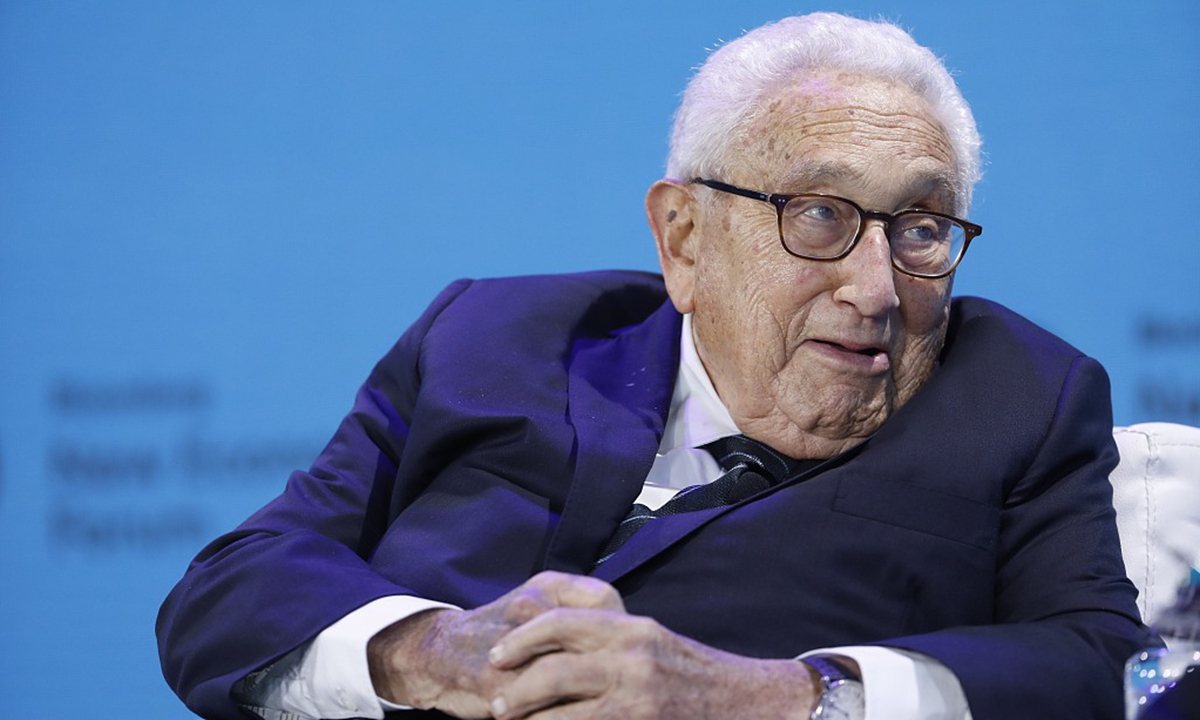
Henry Kissinger. File photo: VCG
Henry Kissinger was only 5 feet, 9 inches tall. But when it came to understanding the importance of China-US relations, he stood taller than anyone. He was a force of intellect, and he wrote more than a dozen books just on diplomacy and international relations. His passing at the age of 100 will lead to many assessments of his life and his work. One certainty: It will be a long time before any American comes close to matching the respect he had, particularly in China.
Before we take a look at that, let's first take a look at the past.
For all of his intelligence and diplomatic skill, history might best remember him for the acting job he took on in the summer of 1971. Kissinger fell "ill" in Pakistan that year, staging a sickness that allowed him to secretly travel to China. There, he met with then Chinese premier Zhou Enlai, saying, "We have come to the People's Republic of China with an open mind and an open heart." Kissinger's message at that time and then later was clear: China deserved a place on the global stage, and US president Richard Nixon was determined to see that happen.
The conversations between Kissinger and Zhou paved the way for an even more historic trip, the one taken by president Richard Nixon to China roughly seven months later. That visit in late February 1972 and the diplomacy associated with it affirmed that China-US relations, which had been moribund for more than two decades, would resume. And, yes, that visit confirmed that China was about to become a leading presence on the international stage. President Nixon later said that his time in China should be considered "the week that changed the world."
Kissinger left the government in 1977, but he remained active in diplomatic and academic life. He held no office - appointed or elected - over the final years of his life, but he remained the elder statesman of the US diplomatic core. His books, essays, television appearances and other public-facing events confirmed Kissinger knew that the US was foolish to engage with China in the 21st century with a 20th-century mind-set. In his book On China, he wrote: "China, fulfilling its own interpretation of its national destiny, will continue to develop its economy and pursue a broad range of interests in Asia and beyond ... [This] suggests an evolution in many aspects of which China and the United States cooperate as much as they compete." A few paragraphs later, he added: "The United States and China owe it to their people and to global well-being to make that attempt."
Kissinger often made that attempt.
The Chinese government and the Chinese people revered Kissinger right up to his death in part because he encouraged positive bilateral relations. Four months ago, he made his final trip to the country, where he met with President Xi Jinping, director of the Office of the Foreign Affairs Commission of the CPC Central Committee Wang Yi and other top Chinese officials. President Xi told Kissinger that the Chinese people value friendship, and will never forget Kissinger, an old friend of China, and his historic contributions to promoting the growth of China-US relations and enhancing the friendship between the Chinese and American people.
This last trip was not pomp and circumstance. Kissinger most definitely was not being rolled out like some ceremonial figure who had long lost gravitas. Remember, this visit took place in the summer of 2023, when the first steps were being taken by the US to restart fractured relations with China. With distractions such as balloons getting in the way of meaningful dialogue, it was Kissinger who again stepped squarely into the diplomatic arena. The BBC returned to a familiar theme surrounding that trip to China, reminding its readers that "he could act as a backchannel for US-China negotiations."
There was no living current or former political figure who could represent the US at that moment other than Kissinger. Many tributes will follow in the days to come, and, yes, many people who reviled him will have their say, too. But perhaps the most consequential tribute appeared in Politico, a leading US-based news organization that focuses on politics. The headline of the retrospective it offered on Kissinger noted he was a diplomat who "helped to reshape the world."
The author is an associate professor at the Department of Communication and Organizational Leadership at Robert Morris University. opinion@globaltimes.com.cn




